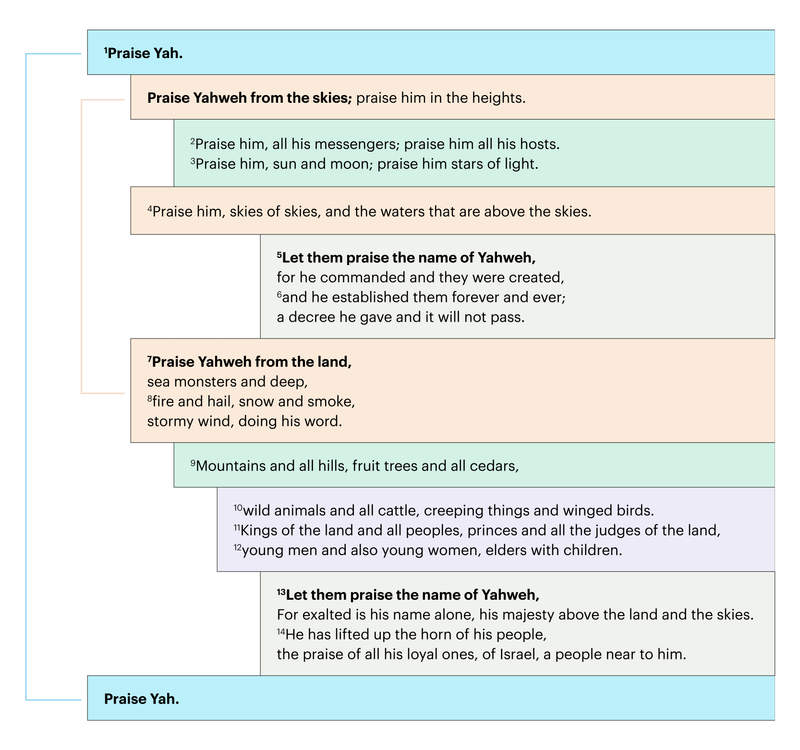The Exalted Horn of Psalm 148
The Bible's "Horn of Salvation" Explained

Psalm 148 calls on the whole cosmos, above and below, to praise God. All of God’s creatures should join in the chorus, for God created and sustains them all.
In the climactic conclusion of Psalm 148, we see that Israel should praise God because he has raised a horn of salvation for them.
Praise the name of Yahweh,
for he has lifted up the horn of his people.
But what’s the deal with this horn? And why is God lifting it up?
Let’s check it out!
The Story of the Psalms
To understand the signifance of the horn, we first need to understand the book of Psalms.
The book of Psalms is a large collection of poems in the Hebrew Bible. Each poem has been expertly crafted and placed where it is within the book to create one complete storyline from the book’s beginning to its end.
The book of Psalms poetically retells the entire biblical story.
The 150 poems in the book of Psalms are broken up into five sections.
Introduction: Psalms 1-2
Book 1: Psalms 3-41
Book 2: Psalms 42-72
Book 3: Psalms 73-89
Book 4: Psalms 90-106
Book 5: Psalms 107-145
Conclusion: Psalms 146-150
Psalms 1 and 2 introduce the story by laying out the main themes of the entire book. They do this by reviewing the biblical storyline.
Psalm 1 paints a portrait of hope about an upright human who delights in God’s wisdom (i.e. Torah, or “instruction”). This person is said to be like the tree of life, echoing back to the garden temple in the first pages of Genesis (Genesis 2:8-9). This person eternally blossoms because they have been planted in the river of God’s life.
After humanity’s foolish rebellion, God made a promise. A future human, the seed of the woman, would come and defeat evil and restore the world (Genesis 3:15).
This story continues in Psalm 2. God promises that a king would come from the line of David and would be called the “son of God” and the “Messiah” (Psalm 2:2; Psalm 2:7). God appoints this king to bring justice on human evil and to restore God’s Kingdom and peace over the nations.
The Psalms continue to develop these themes throughout the five sections. The first two sections explore the complicated story of David and his royal family. The third section focuses on the tragedy of Israel’s exile and the downfall of David’s royal line. But the fourth and fifth sections rekindle the hope for the Messiah, a new temple, and God’s Kingdom on the other side of the exile. Finally, the book ends with a five-part conclusion, praising God for his faithfulness.
And this is where we find Psalm 148.
Genesis and the Design of Psalm 148
Psalm 148 is in the middle of the five-psalm conclusion of the book.
This conclusion is also known as “The Final Praise” because each of the five psalms begins and ends the same way: Praise Yah!
This line is usually translated “praise the LORD,” but in Hebrew, it’s “hallelu-Yah,” meaning praise Yah (short for Yahweh). Today, it is common for people to use hallelujah as a way to praise God. But in Hebrew, hallelujah is not something you say to God; rather, it’s what you say to other people when you invite them to praise God. It is a call to praise the Lord. It’s about the call, not the content of the praise.
And in Psalm 148, the psalmist calls for all the creatures in two different realms to praise Yahweh. The realm of the sky and the realm of the land and everything that fills them.
The wording of the “sky” and the “land” might sound familiar to you. Check out the design of Psalm 148 below.

The psalmist calls for the skies and its inhabitants to praise (verses 2-6) and the land and its inhabitants to praise (verses 7-12). This language echoes back to Genesis 1, when God created the skies and the land (Genesis 1:1). By doing this, the psalmist is summoning the entire cosmos and all of its inhabitants to praise their Creator.
The psalmist begins with the skies—the outer lines describe the spaces of the sky realm, and the middle section describes the inhabitants of the sky (see Genesis 1:6-9; Genesis 1:14-19). All creatures that inhabit the skies—all of the spiritual beings (e.g. messengers/angels, elohim, sun, moon, stars, etc.)—are called to praise Yahweh.
The psalmist then pauses between each section to offer the reason for each realm to praise their Creator. First, we’re told why the skies should praise Yahweh. Creation obeys God’s established laws that don’t change. Creation follows the orders of their maker. All of God’s creatures of the skies should join in the chorus, for God created and sustains them all by his command.
The psalmist then turns to the land—everything below the skies is called to praise Yahweh. Beginning with the sea monsters of the deep and progressing through to trees and animals, kings and children, all the inhabitants of the land are called to worship their Creator.
Then the psalmist gives the reason for the land to praise. In particular, we see that God’s people (Israel) should praise God because he has raised “a horn” for them.
So what is this horn all about?
The Horn of Psalm 148
Let’s first take a look at a different psalm. In Psalm 92:10, the psalmist writes:
You have exalted my horn like that of the wild ox;
I have been anointed with fresh oil.
This metaphor of the “exalted horn” comes from an image of a bull lifting up its horns after winning a battle. The raised horn is a common biblical symbol of victory, especially of being rescued from oppression.
When this metaphor means victory (Psalm 89:24; Psalm 112:9; Zechariah 1:21), and when God “exalts the horn” of someone, he is bringing victory to the oppressed.
In 1 Samuel 2, we find Hannah rejoicing in song after the birth of her son Samuel. After years of infertility, Hannah rejoices because “in the LORD [her] horn is lifted high” (1 Samuel 2:1). A prominent idea in Hannah’s song is God’s righteous judgment. She rejoices that he brings down the proud and exalts the humble (verses 6-8). And she concludes her song by asking God to judge all of creation, calling for the reign of God’s Kingdom on the earth (verse 10)—to “exalt the horn” of his anointed one, the Messiah.
Remember, the book of Psalms tells the story of the Hebrew Bible. It’s the story of God’s promise to raise up a king who will bring victory to Israel and rescue the world. And if we’ve been reading carefully up to this point, there is little question that the psalmist in Psalm 148 is referring to this promised king (see Psalm 110:7).
God will raise up this horn for his people—the horn of which the psalmist writes and Hannah sings.
Jesus, the Promised Horn
And many years later, we read two more songs of praise in the Bible. The first is Mary’s Song.
Like Hannah, Mary rejoices over the baby in her womb, marveling at God’s might and his mercy. She praises him for being a righteous judge who humbles the proud and exalts the humble (Luke 1:52). Mary concludes her song by proclaiming that God has remembered his covenant with Abraham. He has remembered his promise of a Messiah (Luke 1:54-55).
The second song comes from Zechariah, who has just held his son, John, in his arms. Filled with the Holy Spirit, Zechariah sings:
“Blessed be the Lord God of Israel,
For He has visited us and accomplished redemption for His people,
And has raised up a horn of salvation for us
In the house of David His servant.”
Zechariah’s song for his son will pave the way for the long-awaited “horn of salvation.”
Jesus Has Come
And followers of Jesus today join in the song. With all of creation—the skies, the land, and everything in between—we sing praises to God for he has lifted up for us a horn of salvation.
Jesus has come! And we look with great anticipation for that future day when all of creation, above and below, will praise God in the new heavens and the new earth (Revelation 21:1-5).
Hallelu-Yah!
This article was written by Shara Drimalla with scholarly editorial review by Dr. Carissa Quinn. Additional scholar research and resources provided by Dr. Tim Mackie. Copy-edited by Kenzie Halbert-Howen.
